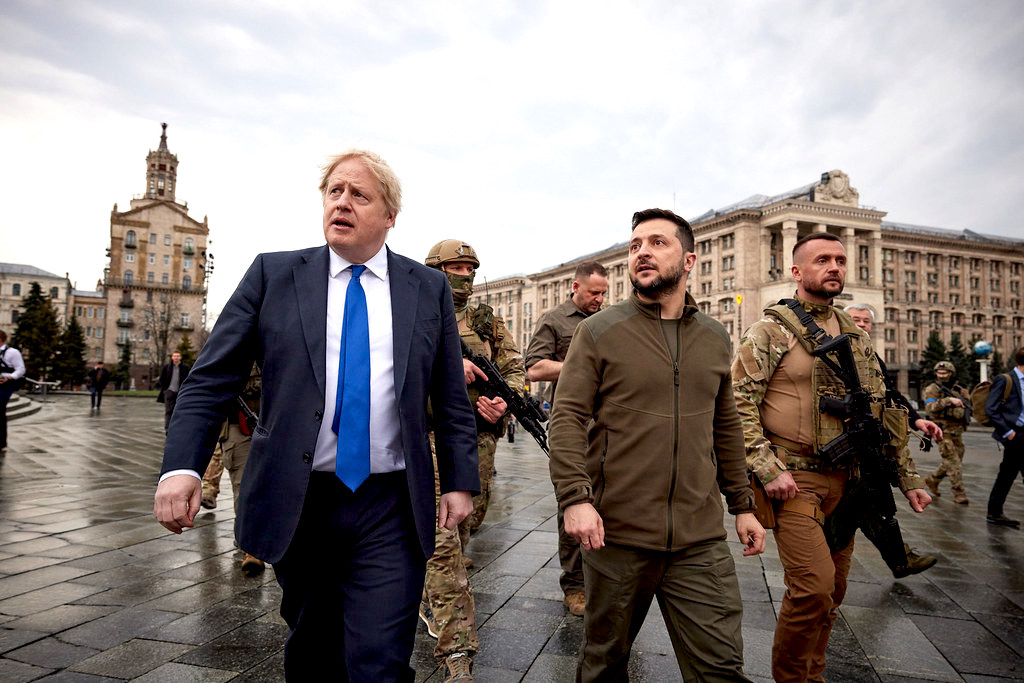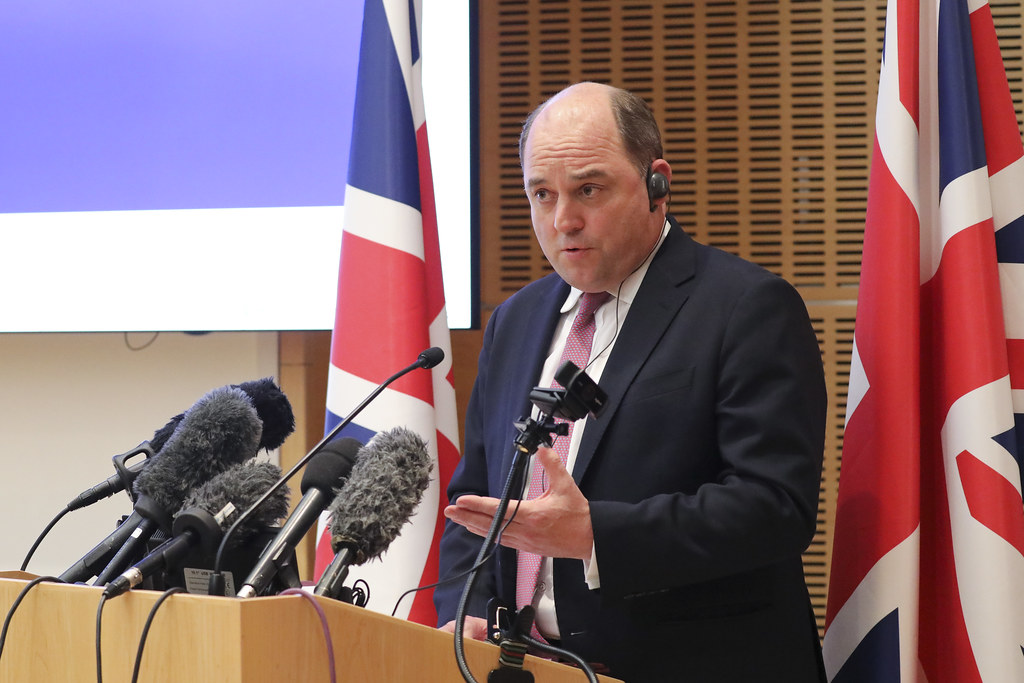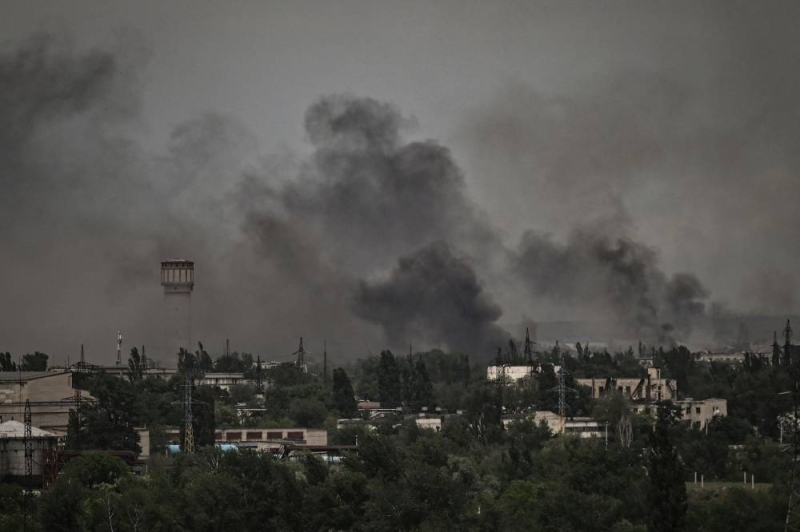As Russia presses victory in the Donbass, U.S. and U.K. missiles threaten a new stage in the conflict, writes Christopher Nineham.

U.K. Prime Minister Boris Johnson, left, meeting Urkaine’s President Volodymyr Zelensky in Kiev, April 9. (Ukraine government)
By Christopher Nineham
Stop the War
As even some of the mainstream media point out, on top of the four precision-guided, medium-range rocket systems sent by the U.S. last week, this decision marks a new stage in the war in which the West is prepared to provide the Ukrainian military with the capacity to strike deep in to Russian territory, something they previously carefully avoided.
This is one in a series of escalations on the part of the Western powers. It provoked immediate retaliation in words and deeds from Russian President Vladimir Putin — including the first bombardment of Kiev for five weeks — as Western leaders must have known it would.
It underlines the fact that the West is still pushing for nothing less than the complete defeat of Russia while Russian troops continue their offensive.
As British Defence Secretary Ben Wallace said in a statement announcing the new weapons shipment, “If the international community continues its support, I believe Ukraine can win.”

U.K. Defence Secretary Ben Wallace during a press conference at the British Embassy in Moscow on Feb. 11. (U.K. government)
As part of this policy of proxy war, the West has been deliberately trying to head off moves towards serious negotiations. The leading pro–Western Ukrainian newspaper Ukrayinska Pravda reported recently that U.K. Prime Minister Boris Johnson himself appeared in Kiev early in May almost without warning, urging Ukraine’s President Volodymyr Zelensky not to negotiate with Putin.
“If you are ready to sign some guarantee agreements with him, we are not,” Johnson said, insisting it was instead the time to “press him.” Johnson later confirmed to French President Emmanuel Macron that he had “urged against any negotiations with Russia on terms that gave credence to the Kremlin’s false narrative for the invasion.”
It is first and foremost the Ukrainians who will suffer from this approach, as the conflict turns into a terrible war of attrition. But the war has global implications and the risks of a frightening military clash between nuclear armed great powers are higher than at any time for half a century.
To understand this situation and to be able to challenge it, we have to see beyond the West’s simplistic story that this is a war between the Western values of freedom and democracy and Russian despotism.
The anti-war movement opposed the Russian invasion from the start. But the West bears a heavy responsibility for this disaster. Senior U.S. foreign policy figures from Henry Kissinger to Madeline Albright and from George Kennan to William J. Burns, the current head of the C.I.A., have advised that the eastward expansion of NATO up to the Russian borders would be deeply provocative to the Russian ruling class. NATO decision makers knew this, but carried on regardless.
Last minute diplomacy might well have averted the war. Many senior former U.S. diplomats and Russia experts urged the U.S. to accept Vladimir Putin’s offer of talks before the invasion took place in January. The advice was rejected. As Ivan Katchanovski, a Ukrainian professor of political studies at the University of Ottawa argues, “The U.S. and U.K. governments show no efforts or desire to achieve peaceful settlement of the armed conflict between Russia and Ukraine.”
Now Britain and the U.S. appear to have abandoned even the limited military restraint they showed early on in the war. Their policy of pumping in the weapons and pushing for outright victory risks disaster.

Christopher Mark Nineham is a British political activist and founder member of the Stop the War Coalition serving as national officer and deputy chair of the Stop the War Coalition in the U.K. He served under Jeremy Corbyn from 2011 to 2015.
The views expressed are solely those of the author and may or may not reflect those of Consortium News.

Smoke and dirt rise in the city of Severodonetsk during fighting between Ukrainian and Russian troops at the eastern Ukrainian region of Donbas on June 2, 2022. — AFP pic
LYSYCHANSK, June 9 — Ukrainian soldiers in Severodonetsk are fighting “one of the most difficult” battles against Russian troops since the start of the war, President Volodymyr Zelensky said, adding the fate of the whole Donbas region rests in the eastern city.
Moscow’s forces are concentrating their firepower on the strategically important industrial hub as part of efforts to capture a swathe of eastern Ukraine.
After days of raging street battles, Ukrainian officials conceded that Russian troops control a large part of Severodonetsk, and that their forces might have to pull back due to constant shelling.
In his evening address to the nation, Zelensky said the battle for the city was “very fierce... very difficult. Probably one of the most difficult throughout this war.
“In many ways, the fate of our Donbas is being decided there.”
After being repelled from Kyiv and other parts of Ukraine following their February invasion, Russian President Vladimir Putin’s troops have refocused their offensive on the Donbas region, comprising Lugansk and Donetsk.
The cities of Severodonetsk and Lysychansk, which are separated by a river, were the last areas still under Ukrainian control in Lugansk.
Lysychansk is still in Ukrainian hands but under fierce Russian bombardment.
At the United Nations, Secretary-General Antonio Guterres added his voice to increasingly dire warnings about the conflict’s impact.
“For people around the world, the war is threatening to unleash an unprecedented wave of hunger and destitution, leaving social and economic chaos in its wake,” he said.
Little progress on grain
At talks in Ankara, Russia and Turkey made little headway in striking a deal to secure safe passage for grain exports stuck in Ukraine due to a Russian sea blockade.
At the request of the United Nations, Turkey has offered its services to escort maritime convoys from Ukrainian ports, despite the presence of mines — some of which have been detected near the Turkish coast.
“We are ready to do this in cooperation with our Turkish colleagues,” Russian Foreign Minister Sergei Lavrov told reporters in Ankara.
Kyiv said it would not demine waters around the Black Sea port of Odessa to allow grain exports, citing the threat of Russian attacks on the city.
Lavrov’s Turkish counterpart Mevlut Cavusoglu called Russian demands for an end to sanctions to help grain onto the world market “legitimate”.
“If we need to open up the international market to Ukrainian grain, we see the removal of obstacles standing in the way of Russia’s exports as a legitimate demand,” he said.
But Kyiv, which was not represented at the Ankara talks, pushed back against claims that Western sanctions on Moscow had sent prices soaring.
“We have been actively communicating, the president and myself, about the true cause of this crisis: it is Russian aggression, not sanctions,” Ukraine’s Foreign Minister Dmytro Kuleba said.
Before the war, Ukraine was a major exporter of wheat, corn and sunflower oil. Russia’s blockade has been blamed for contributing to soaring prices, stoking fears of a looming food crisis in poor countries.
As he hosted Mediterranean ministers for talks on the global food crisis, Italian Foreign Minister Luigi Di Maio warned “millions” could die unless Russia unblocked Ukraine’s ports.
But Kremlin spokesman Dmitry Peskov rejected suggestions that grain stuck in Ukrainian ports was fuelling the problem.
“As far as we know, there is much less grain than the Ukrainians say. There is no need to exaggerate the importance of these grain reserves,” he told reporters.
‘Bombings every day’
Severodonetsk appeared close to being captured just days ago but Ukrainian forces launched counterattacks and managed to hold out, despite warnings they were outnumbered by superior forces.
About 800 civilians trapped by the fighting have taken refuge in the city’s Azot chemical factory in the city, according to the lawyer of a Ukrainian tycoon whose company owns the facility.
Ukrainian authorities have yet to confirm the report.
The situation was also increasingly desperate in other parts of the Donbas.
In the city of Bakhmut, an unoccupied school building was reduced to a smouldering wreck after being shelled Wednesday, with burnt books visible among the rubble, according to AFP journalists. No injuries or deaths were reported.
In Severodonetsk’s twin city Lysychansk, residents who had chosen to stay were facing fierce Russian bombardments.
“Every day there are bombings and every day something burns. A house, a flat... And there is nobody to help me,” 70-year-old Yuriy Krasnikov told AFP.
“I tried to go to the city authorities, but nobody’s there, everyone has run away.”
There was some rare good news for Ukraine, as their football side clinched a 1-0 Nations League victory over the Republic of Ireland on Wednesday.
The victory — thanks to a free kick from Viktor Tsygankov — lifted the country’s spirits after their painful failure to qualify for the World Cup. — AFP
Jason Melanovski
3 June 2022
Following the surrender of hundreds of its members to Russian forces in the city of Mariupol, Ukraine’s Azov Battalion has undertaken a PR rebranding effort to distance itself from its neo-Nazi background by introducing a new chevron which Azov refers to as “Three Swords,” or a golden trident. The symbol will be used by the newly created Azov Special Forces Unit based in Kharkov.
The “Three Swords” refers specifically to a monument installed at the Azov Regiment’s base in Mariupol. Oleksyi Reins, a member of the Azov Battalion described it as a “symbol of military glory and promise of revenge on its enemies.”
Previously, Azov forces used a Nazi-linked Wolfsangel symbol that Azov claims represents the “idea of the nation,” and which unites the letters “I” and “N” in old cyrillic script. In reality, the insignia is a blatant copy of the Wolfsangel symbol, which was widely used by various Nazi military formations, including several SS divisions that committed massacres during World War II.
While Mariupol was the main headquarters of the original Azov Battalion, various forces operating under the Azov umbrella exist in several other major Ukrainian cities, namely Kharkov and Kiev.
The logo swap was first reported widely in English by The Times in an article entitled “Azov Battalion drops neo-Nazi symbol exploited by Russian propagandists,” suggesting the use of neo-Nazi imagery by a Western-backed military organization is only of note due to ubiquitous “Russian disinformation.”
The article tried to deny that the Ukrainian government is attempting any conspicuous rebranding effort by pointing out that the new logo was unveiled for the Azov Special Forces Kharkov and is supposedly separate from the Azov Battalion formerly based in Mariupol.
However, in reality, as Azov member Oleksyi Reins acknowledged, Azov Special Forces Kharkov was “founded by veterans of the Azov Battalion.”
Furthermore, during the unveiling of the new “Three Swords” logo in Kharkov, the commander of the new unit, Maksym Zhorin, stated, “On the same principles and ideological basis as the legendary Azov Battalion, we form new divisions. Every day they become more numerous and professional.”
According to the Ukrainian government, the supposedly new “Azov” was formed as part of the Territorial Defense Forces on February 24, 2022—the day of the Russian invasion of Ukraine—and is now part of the Ukrainian Special Forces.
The various shifts in Azov’s naming, logos and official status within the Ukrainian state are an obvious attempt to obfuscate its neo-Nazi ties.
These efforts are no doubt coordinated with Washington as part of an attempt at “damage control” amid growing suspicion and wariness about Western propaganda on the war in Ukraine and the “democratic” pretenses of the imperialist powers, in particular. The imperialist powers, with the US taking the lead, have been funding these neo-Nazi militias with billions of dollars as COVID-relief measures have been scrapped and inflation at home is tearing away at basic living standards.
As for Azov’s history and ideology, it is clearly a fascist organization that traces its heritage back both to Nazism and far-right Ukrainian nationalist organizations such as Organization of Ukrainian Nationalists (OUN-B) and the Ukrainian Insurgency Army (UPA), which were responsible for the massacres of tens of thousands of Jews, Poles as well as Ukrainians during World War II.
Its founder Andriy Biletsky, previously the leader of the fascist paramilitary Patriot of Ukraine organization, is an outright white supremacist who in 2010 stated that the mission of Ukraine is to “lead the white races of the world in a final crusade … against Semite-led Untermenschen[subhumans].”
In 2014, far-right thugs, including many future members of Azov, helped carry out a US-backed coup against the elected, pro-Russian President Viktor Yanukovych. The Azov Battalion was formed right after the coup. Following the outbreak of civil war in the eastern Donbass region, it was systematically built up and supported with military aid and training primarily coming from the United States, Canada and the United Kingdom.
In November of 2014, with the official Ukrainian Army in shambles and plagued by mass desertions, Azov was incorporated into the newly created National Guard of Ukraine. In the following years, Ukraine received billions in funding and training from Western military officers and played an essential role in carrying out the war against pro-Russian separatists in the east, often with notoriously brutal tactics.
Between 2015 and 2016, the Office of the United Nations High Commissioner for Human Rights connected Azov with war crimes, including mass looting, unlawful detention and torture.
Despite its minimal electoral support within Ukraine, Azov became so powerful within the Ukrainian state that in October 2019 Azov effectively shut down the recently elected President Voldymyr Zelensky’s initial attempts to withdraw Ukrainian forces from the frontlines in the Donbass and implement the 2015 Minsk peace accords.
During a visit to the demarcation line near the village of Zolotoye, Zelensky was confronted by Azov veterans who warned him against withdrawing troops and continuing the peace process as outlined by the Minsk accords. Azov’s leader, Biletsky ominously threatened at the time, “If the President and the Government do not fulfill their direct duty to protect every inch of the Ukrainian land, then we, the volunteer veterans, will do it again.”
Zelensky, originally elected in 2019due to widespread disillusionment with the war and widespread poverty, would subsequently go on to adopt increasingly pro-war nationalist policies in agreement with Washington and the far-right, helping create the conditions that led to the current disastrous war that has already killed tens of thousands and ruined the lives of millions.
Following the initial Russian invasion of Ukraine in February, Azov soldiers were shown carrying out war crimes using cruel tactics in line with their neo-Nazi ideology and history.
Despite a massive propaganda campaign aimed at legitimizing the Azov Battalion in the Western media, more and more reports have surfaced, including in the bourgeois media, that clearly show Azov’s fascist orientation, and explode the “democratic” pretenses of imperialist propaganda over the war.
In Mariupol, civilians have accused Azov forces of deliberately shooting at fleeing cars and kidnapping residents in order to have them serve as human shields while they bunkered within the Azovstal plant and hid from Russian forces.
According to the French newspaper Le Monde, in a video recently shared on social media, Azov members can be identified shooting the knees of defenseless Russian soldiers. Former French soldier Adrien Bocquet, who traveled to Ukraine to serve as a volunteer medic with the Azov Battalion in Kiev and then Lviv, has said that he witnessed Azov troops shelling civilian areas in Bucha, where Russian forces have been accused of killing ordinary people.
Kiev’s half-hearted efforts to rebrand Azov make clear that the Ukrainian government will continue to heavily rely on these fascist forces as it functions as a proxy for an ever more direct war by the imperialist powers with Russia.
No comments:
Post a Comment